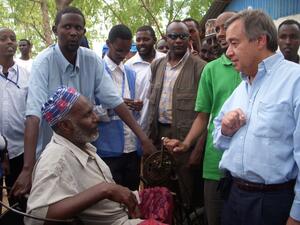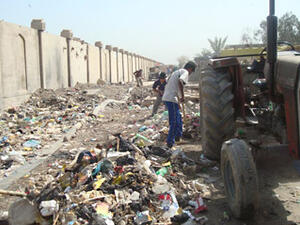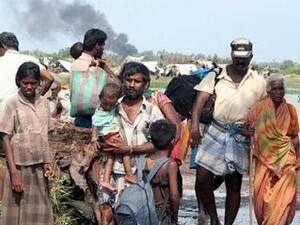Afghanistan at the crossroads: Invest in Afghan returns or risk further displacement, cautions UNHCR
Afghanistan at the crossroads: Invest in Afghan returns or risk further displacement, cautions UNHCR

High Commissioner António Guterres listens to the problems of this year's returnees at Chamtala makeshift settlement in Nangarhar province, eastern Afghanistan.
JALALABAD, Afghanistan, November 18 (UNHCR) - Afghan returnees need more support to settle back home, or could be uprooted again, warned UN refugee agency chief António Guterres as he started a five-day visit to Afghanistan this week.
The High Commissioner arrived in Jalalabad in eastern Afghanistan on Monday and met with former Afghan refugees who had returned from Pakistan. At Chamtala, a makeshift settlement of tents in the windswept desert, the returnees told him about their immense needs.
"For the time being, our needs are great," said Malik Nawab, an Afghan elder at the settlement. "We need shelter, food, schools, and we're asking UNHCR not to forget us."
Most of Chamtala's 3,500 families returned this summer after the closure of Jalozai refugee village in north-western Pakistan. Guterres noted that in addition to the distribution of UNHCR relief items, the government had agreed to allocate land for them at Chamtala, and promised to push for the speedy and fair distribution of plots.
"Many of you said a plot is not enough," Guterres told the elders. "It is necessary to build shelter, provide safe water supply and health facilities. Most important are job opportunities, the possibility to earn an income for the family. UNHCR has a limited mandate and resources. But we're working with the government and mobilizing development partners to make life better."
At Sheikh Mesri township, a three-year-old government land allocation site, returnees from 2005 told the High Commissioner they needed a high school to supplement the existing primary school; a 24-hour clinic; and affordable public transport to find work in Jalalabad city, some 14 kilometres away.
"If you can improve facilities here, our living conditions will be even better than Jalalabad," said an elder at Sheikh Mesri, currently home to some 1,000 returnee families. "And if the international support continues, many more refugees could come back to Afghanistan."
More than 5 million Afghan refugees have returned home since 2002, mostly from Iran and Pakistan. While the large majority have been able to go back to their areas of origin, more recent returnees are facing a lack of land, shelter, security and socio-economic opportunities in their villages.
In Kabul on Tuesday, the High Commissioner met Afghans displaced by conflict in Wardak and Kapisa provinces. He also spoke to a group of returnee families who had deserted their government-allocated land in Parwan province due to a lack of jobs, and are now living in a Kabul slum where they survive by begging and washing cars. Guterres pledged to provide them with winterization supplies and to negotiate a bus service for job seekers in the Parwan township.
"Today my main concerns are that many returnees are becoming displaced within Afghanistan," said the UNHCR chief. "Others have gone back to live as irregular migrants in the region. They have no documentation or legal status, and are vulnerable to smugglers and dangerous situations." He stressed that sustainable returns are contingent on the mobilization of government capacity in Afghanistan and increased international support for development projects.
On Wednesday, Guterres will join Afghan Foreign Minister Rangin Dadfar Spanta in chairing an international conference on the return and reintegration of Afghan refugees. The event will seek international support to strengthen the reintegration component of the Afghanistan National Development Strategy (ANDS).
By Vivian Tan in Jalalabad, Afghanistan









